'Zooming' in on body image issues during Covid-19
Nov 04, 2020
6 mins
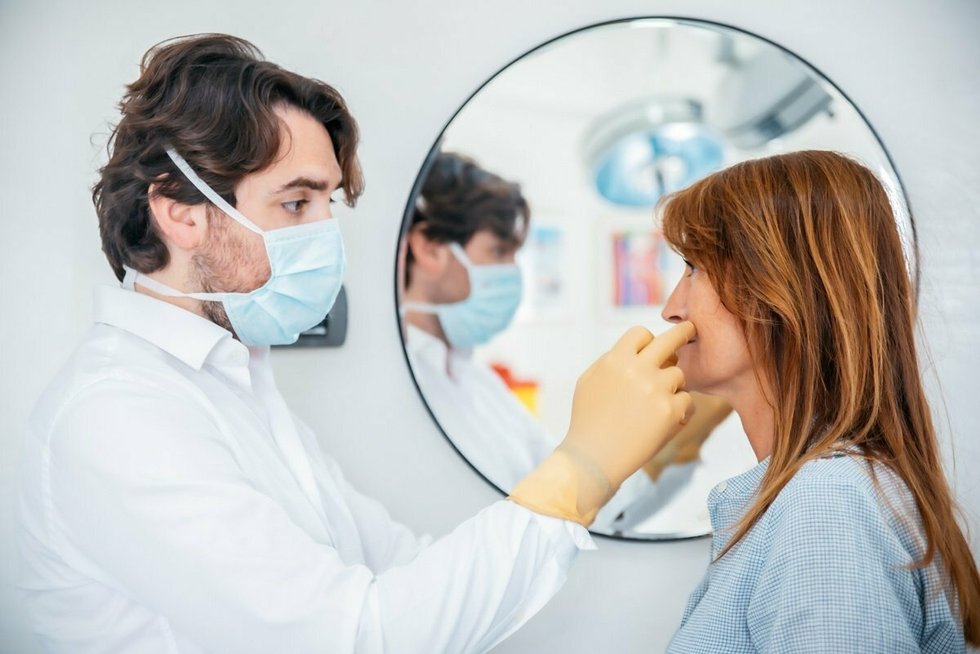

Journalist
In 2020, Denise Willis had to look at her own face for hours every day during video calls for her job as a teacher. Before every class, she switches on the camera and is met with her own reflection. “It’s almost like when you hear your voice recorded,” she said. “You have this image in your head of how everything is supposed to look and sound, and the initial pop-up throws you off.”
Willis is not the only one who’s been looking at her reflection more than usual. The pandemic has forced many of us to work from home—almost half of all UK workers did so during the first lockdown—which means we are spending more time on video calls to keep connected. Here we investigate the impact that seeing ourselves on screen all day is having on our mental health.
“I don’t feel comfortable teaching an online class or attending a remote meeting unless I’m wearing make-up and my camera’s beauty filters are cranked to the max.” - Denise Willis
Denise Willis’s worries about her appearance are not helped by some of her brutally honest young students. “I’ve had kids comment on my nose and eyes being too big, my mouth being too small, and my skin being too pale and grey,” the 34-year-old said.
The comment about her complexion is the one that stuck. Willis knows her skin doesn’t look its best, exacerbated by lack of sleep and stress. “I notice the quality of my skin declining,” she said. “Wrinkles have started settling in, especially around my eyes. I don’t feel comfortable teaching an online class or attending a remote meeting unless I’m wearing make-up and my camera’s beauty filters are cranked to the max.”
Niggling insecurities as the camera turns on are something freelance journalist Lizzie Kirsten, 43, has also experienced. She recently met a colleague in person who commented on how young she looked in real life—as opposed to on screen. “I realized how poorly my appearance comes across via video,” she said. “Looking in the mirror in the last week, I wondered if I’d consider having plastic surgery to lift the skin above my eyes.”
Video calls: An unexpected issue
Who could have predicted the sudden popularity of work video calls? In January 2019, Zoom had 10 million daily meeting participants. By April 2020 this had risen to 300 million. Microsoft Teams also reported an astronomical rise in users—up 1,000% in March 2020—and said the number of users turning their cameras on in meetings has doubled since before the pandemic.
As this is a new phenomenon, there are no recent academic studies that examine the relationship between video calls and body image dissatisfaction (Bid). A 2016 survey revealed our insecurities: 35% of workers feel less attractive on video calls than in real life and 48% worry more about how they look on camera than what they will say. Meanwhile, 39% of those surveyed didn’t like appearing on camera at all.
How the pandemic makes it worse
Covid-19 is enough to shake anyone’s relationship with their body image. Our exercise routines and eating habits have been thrown off-kilter, which has made so-called “Covid kilos” a common problem. Research from the UK’s Covid Symptom Study app shows that 29% of people surveyed have gained weight since the pandemic began.
At the same time, the hours we spent online reached a record high during lockdown, according to an Ofcom report. There was a 36% increase in the use of social media, which has been proven regardless of whether you are posting selfies or a lurker.
We are looking at ourselves more than ever before, not just for work, but to chat with friends and family.
What if we can’t turn the camera off?
“So, they’re being confronted with their appearance. A lot of them are going to be finding it very, very difficult.” - Dr. Helena Lewis-Smith
Dr. Helena Lewis-Smith is a senior research fellow at the Centre for Appearance Research at the University of the West of England. She believes that video calls could have a significant impact on body image issues, especially for those who are already insecure. “People who avoid looking at themselves are now having to do so, whether they like it or not, on the screen for work,” she said. “So, they’re being confronted with their appearance. A lot of them are going to be finding it very, very difficult.”
…even polite, positive comments can have a detrimental effect.
Many of us don’t have the option to turn the camera off during meetings. With video calls, Dr. Lewis-Smith believes forced exposure to our reflections could cause “an increase in preoccupation with appearance”, even for those who normally have a positive body image.
Our appearance is also something colleagues focus on “more so than in a face-to-face meeting” as an easy way to make virtual small talk. Dr. Lewis-Smith says even polite, positive comments can have a detrimental effect if we are already feeling self-conscious. “If someone says, ‘Oh, you’ve had your hair cut, it looks really nice,’ and the other people aren’t receiving that compliment, they might be made to feel bad about themselves,” she said.
The pressure to look professional
People who experience negative body image as a result of using social media might sign out for a while, but this is not an option for work calls. There is also the need to look professional. Someone facing a big office meeting might have put on a great suit or a pair of heels to look the part. Now, the only tweaks that make a difference are in the shot, from the shoulders up.
Before work calls, Willis puts on make-up and fixes her hair. “Lighting is a thing I’m always worried about. I don’t want to look like I’m coming out of a scary campfire story. Usually, I place a lamp directly behind the webcam that shines on my face,” she said. Kirsten also believes more flattering lighting and “learning how to do my make-up a bit more professionally” would help her look her best on screen. She is considering investing in microblading, a tattooing technique, to enhance her eyebrows.
Willis has also considered “less invasive cosmetic procedures” including Botox and deep chemical peels to help her look better on camera. Others are even going under the knife. The Cadogen Clinic in London reported a 100% increase in treatments in August and September compared with 2019. The clinic saw a major increase in inquiries for procedures to combat signs of aging and tiredness around the forehead, eyes, and neck.
Women face a ‘double standard’
Dr. Lewis-Smith believes that the impact of screen time on body image affects men and women, and the increase in video calls could cause significant anxiety in this area for both genders. But when it comes to work calls, the stakes are higher for women.
“There’s a double standard of aging…You have the likes of George Clooney going grey, whereas women aren’t allowed. They have to dye their hair and have Botox.” - Dr. Helena Lewis-Smith
First, women are more likely to be “valued on their appearance”, she said. Second, the standards for women are inherently different, especially when it comes to aging. “There’s a double standard of aging,” said Dr. Lewis Smith. “Men are allowed to grow old gracefully. You have the likes of George Clooney going grey, whereas women aren’t allowed. They have to dye their hair and have Botox.”
“I feel a tension between wanting to look my best and fighting a losing battle against the natural aging process.” - Lizzie Kirsten
During the lockdown, of course, going to the hairdresser or getting Botox is not an option. For some, this was liberating in the first lockdown. For others it was distressing; it increased anxiety surrounding work video calls and it might have even affected work performance. A University of Michigan study found that, in the workplace, “circumstances that make a woman feel self-conscious about how she looks to others might reduce the mental energy she brings to demanding tasks”.
As Kirsten explains, when she sees her image on the screen, “I feel a tension between wanting to look my best and fighting a losing battle against the natural aging process.”
Watch this space
As we face another lockdown, many of us will be working from home indefinitely and continuing to spend hours on work calls. So how do we deal with any insecurities that video calls are causing? Dr. Lewis-Smith recommends the following strategies:
- Try to avoid comparing yourself to others.
- Focus on things you are proud your body can do rather than what it looks like.
- Avoid blaming yourself for physical changes that have occurred during the ups and downs of the past few months.
Dr. Lewis-Smith says it is possible that we will become desensitized to our appearance the more we see it, and possibly become more accepting of it. But it is also possible that we won’t.
Will we see an increase in eating disorders, anxiety or depression, or low self-esteem—all linked to body image dissatisfaction—as a result of the hours we’re spending looking at ourselves on video calls? The evidence doesn’t look good. As Dr. Lewis Smith says, “It’s very much a case of watch this space.”
Photo by Jessy Zeitoun
Follow Welcome to the Jungle on Facebook, LinkedIn, and Instagram, and subscribe to our newsletter to get our latest articles every day!

More inspiration: Mental health
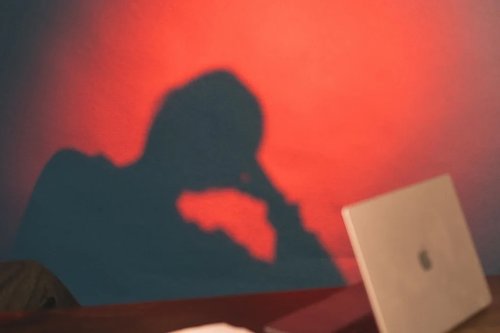
‘We need each other’: Monika Jiang on combating loneliness in hybrid work
Hybrid work offers flexibility but can leave us feeling disconnected. Monika Jiang explores how we can rebuild workplace connections.
Dec 19, 2024
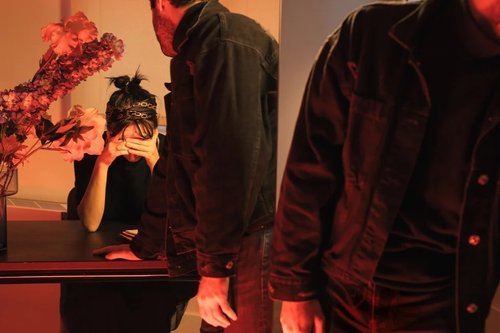
Struggling at work? Here are 3 steps to rebuilding your self-esteem
Low on confidence? Learn how reflection, recharging, and refocusing can help you rebuild self-esteem and thrive professionally.
Nov 27, 2024
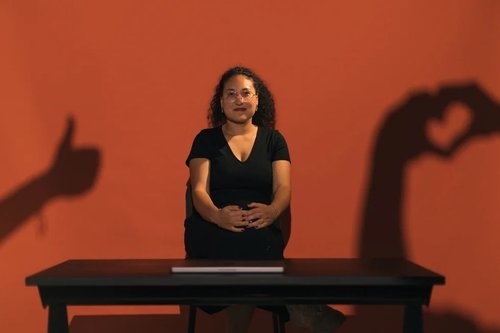
10 ways to beat the Sunday Scaries
Even people who love their jobs can experience the Sunday Scaries. Psychologist Karen Doll offers several strategies to help manage and overcome it.
Sep 12, 2024
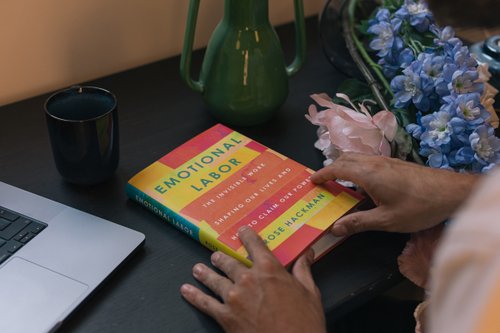
Unpacking the burden of emotional labor
Rose Hackman’s "Emotional Labor" reveals how managing emotions impacts everyone, especially women and minorities.
Aug 08, 2024

Is financial anxiety harming your productivity?
Feeling overwhelmed by financial anxiety? You're not alone. Discover practical steps and expert advice to regain control of your work-life balance.
Jul 31, 2024
The newsletter that does the job
Want to keep up with the latest articles? Twice a week you can receive stories, jobs, and tips in your inbox.

Looking for your next job?
Over 200,000 people have found a job with Welcome to the Jungle.
Explore jobs